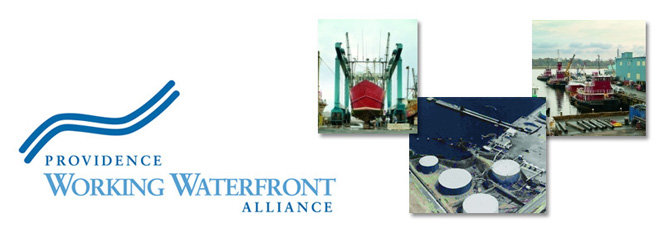Letter to the editor response to Patrick Conley’s October 15th op-ed:
I read Patrick T. Conley’s October 15th op-ed piece, “The different waterfronts of Providence,” with some amusement. I thought Mr. Conley was a historian and not a fiction writer. Unfortunately, his comments about the supposed “wilting waterfront” along Allens Avenue are filled with outright misstatements and faulty logic.
First, Mr. Conley simply lies about the operations at my facility, Promet Marine, which provides repair services to the barges, ferries, tugs, fishing vessels, and U.S. Coast Guard ships that make our vibrant marine economy possible. He claims that we have “unchecked emissions of sandblasted lead and paint overspray.” This is entirely inaccurate as lead has not been used in marine industry paint for more than 20 years. Lead is not in the paints we use today and has not been an issue in any of our sandblasting work. Promet is in compliance with all Rhode Island Department of Environmental Management (DEM) and federal Environmental Protection Agency rules and regulations. Ironically, this is not true of Mr. Conley who never received the necessary DEM permits to dig up contaminated soil on his own property.
Second, Mr. Conley’s piece arbitrarily divides the Port of Providence between the area south of Thurbers Avenue, which he praises as a working waterfront, and the area north of Thurbers Avenue which he deems the “wilting waterfront.” Despite the fact that both Sprague Energy and Promet use the 40-foot deep water channel, have operated in the area for decades, and are an integral part of the region’s economy, because we sit directly next to Mr. Conley’s small parcel of land, he simply dismisses our importance. This is illogical. On the one hand he argues that Motiva’s fuel supply and storage facility, which is sufficiently far away from his own property, is “too viable and necessary to be dislodged.” Yet he completely dismisses the importance of Sprague Energy’s terminal which supplies the vast majority of home heating oil to more than 450,000 Rhode Islanders and is the state’s only source of heavy fuel oil for hospitals, universities, commercial and municipal buildings, and utilities. This convenient situational logic for Mr. Conley’s planned development ignores the interconnected economic nature of the Port of Providence and its benefits to the region.
Finally, Mr. Conley’s “wilting waterfront” phrase is an inaccurate insult to companies that have successfully operated on Allens Avenue for years. Indeed, both Sprague Energy and Narragansett Improvement have continuously operated in their current locations for over 100 years, and Promet has operated at our location for over 30 years. These companies are financially successful, responsible for hundreds of direct and thousands of indirect jobs, and contribute to the entire region’s economy by providing needed heating oil, salt, asphalt, and commercial ship repair services. Far from wilting, our working waterfront companies are thriving, and with the appropriate zoning protections, are poised to attract additional investments to take advantage of huge predicted increases in shipping commerce.
Sadly, Mr. Conley seems to feel that slander and the replacement of existing successful companies with speculative luxury condos is good economic policy. Rather, it is the hard but unglamorous work of Providence’s working waterfront businesses that will best serve our region’s economy over the long term.
Joel Cohen
Chairman, Providence Working Waterfront Alliance

